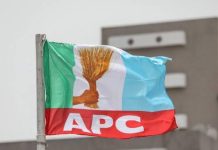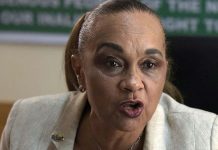Africa Press-Nigeria:
As the two main gladiators in the Edo State governorship election, Governor Godwin Obaseki of the Peoples Democratic Party (PDP) and his key rival, Pastor Osagie Ize-Iyamu of the All Progressives Congress (APC), ready for an epic showdown on September 19, certain undercurrents look set to determine the final outcome.
Tension and speculation are at fever pitch, but from all indications, the battle is not anyone’s to lose yet. However, each passing day reveals gradually evidence that the final outcome may follow some existential extrapolations.
Come September 19, Edo State will go to the polls to elect a governor to pilot the affairs of the state for the next four years. They will either re-elect Obaseki, who is running on his record in the last almost four years, or opt for his main challenger, Ize-Iyamu, who incidentally was Obaseki’s challenger some four years ago.
A two-horse race, the major political parties, APC and PDP, are on a familiar terrain, more so since the candidates of the two parties had contested against each other in 2016. While the incumbent governor, Obaseki, had contested on the platform of APC, Ize-Iyamu carried the PDP flag.
Today, however, fate has swapped platforms for them. Unlike in 2016, when Obaseki contested and won on the APC platform, he has found himself in the PDP ahead of the September 19 election, while Ize-Iyamu, who was PDP’s candidate in 2016, has found himself in APC, which he had left six years ago to pursue his governorship ambition.
Interestingly, both PDP and APC are quite conscious of the importance of the September 19 governorship election to the present political equation in the state, region and country, and their future prognoses, the reason the two parties have set up high-powered election committees to lead them to victory.
APC appointed the governor of Kano State, Abdulahi Ganduje, as the chairman of its election committee, while PDP chose Rivers State Governor Nyesom Wike to lead it in the quest for re-election.
With the stage set and the committees deployed to work, many factors are already competing for attention in the choice of the next governor of Edo State.
Incumbency Factor
Obaseki certainly has the power of incumbency to his advantage. But in Nigeria, this is greatly limited when your party is not in control of the police, military and all other security services that are usually deployed to monitor elections and provide security. The governor’s incumbency advantage may be effectively neutralised by the federal might. As a matter of fact, Ize-Iyamu may even be the ultimate beneficiary of federal might if the lessons of history are factored in.
Off-season elections, like the ones about to hold in Edo and Ondo states, are usually an easier turf to deploy the full powers of the federal government in trying to sway outcomes.
Voting Pattern
What will make the battlefield more interesting is that both contestants know each other in terms of their strengths and weaknesses. But what may likely swing the votes for either of the two remains the calibre of political heavyweights queuing behind him.
Another factor is the voting population. Edo, like any other states of the federation, is made up of three senatorial districts. Edo South has 58 per cent of the state’s voting population, Edo Central has 16 per cent, and Edo North has 26 per cent. But this percentage sharing, unfortunately, may not apply as it currently stands. The factor of candidate’s advantage may play a key role in determining the voting pattern.
Edo South: A Win-win Situation
Edo South holds all the aces, as whoever secures the entire voting strength in the district can as well go to sleep. But it cannot be entirely so this time because the two gladiators are both sons of the soil. So both are going to split the votes of the district.
The people are at an advantage in the sense that whoever wins, power will not shift from the zone. But they are also in a kind of dilemma as to who to support between their two sons. Of key importance here is the personal influence and likability of the candidates and how much of mobilisation they can do.
Edo North: A Battle of Influence
In Edo North, the ballot, no doubt, would be contested between the incumbent deputy governor, Philip Shaibu, who defected with his boss to the PDP, and the former national chairman of the APC, Adams Oshiomhole. The question is, can Shaibu influence enough votes for the PDP to secure a win? The answer seems of little significance, because whatever influence he wields was also because of the Oshiomhole factor. Ordinarily, Shaibu does not command a great deal of foot soldiers, except the usual brigandage invoked to try to influence things by force.
Incidentally, Shaibu has a match in the person of Ganiyu Audu, who is the running mate to Ize-Iyamu. A grassroots politician, who may also ride on the influence of religion, especially, as a Muslim with appreciably large number of faithful, Audu is definitely not a pushover in the equation. His choice appears to have consciously balanced religion – Christian/Muslim ticket, unlike PDP’s Christian/Christian ticket. Interestingly, this is the first time since the 1999 that a Muslim deputy is on the ticket. Many Edo Muslims are likely to see this as a positive for the Muslim community’s long agitation for a voice at the centre of power in Edo State.







